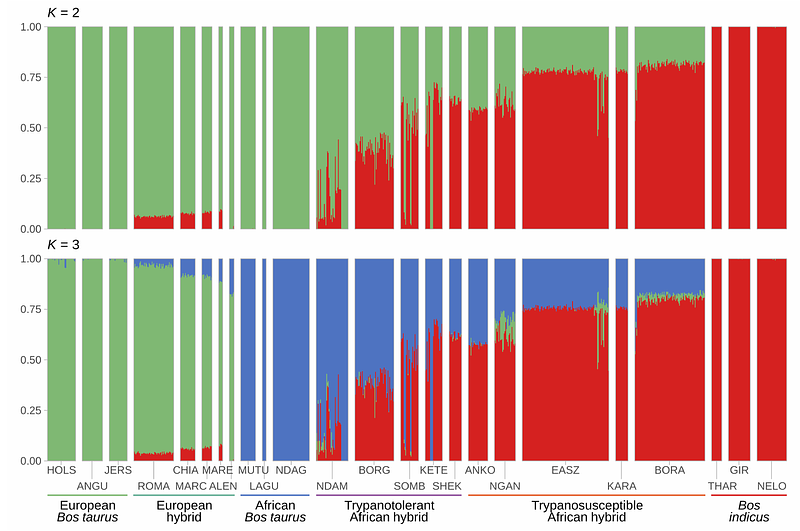Genome-wide local ancestry and the functional consequences of admixture in African and European cattle populations

Genome-wide local ancestry and the functional consequences of admixture in African and European cattle populations
McHugo, G. P.; Ward, J. A.; Ng'ang'a, S. I.; Frantz, L. A. F.; Salter-Townshend, M.; Hill, E. W.; O'Gorman, G. M.; Meade, K. G.; Hall, T. J.; MacHugh, D. E.
AbstractBos taurus (taurine) and Bos indicus (indicine) cattle diverged at least 150,000 years ago and, since that time, substantial genomic differences have evolved between the two lineages. During the last two millennia, genetic exchange in Africa has resulted in a complex tapestry of taurine-indicine ancestry, with most cattle populations exhibiting varying levels of admixture. Similarly, there are several Southern European cattle populations that also show evidence for historical gene flow from indicine cattle, the highest levels of which are found in the Central Italian White breeds. Here we use two different software tools (MOSAIC and ELAI) for local ancestry inference (LAI) with genome-wide high- and low-density SNP array data sets in hybrid African and Italian cattle populations and obtained broadly similar results despite critical differences in the two LAI methodologies used. Our analyses identified genomic regions with elevated levels of retained or introgressed ancestry from the African taurine, European taurine, Asian indicine lineages. Functional enrichment of genes underlying these ancestry peaks highlighted biological processes relating to immunobiology and olfaction, some of which may relate to differing susceptibilities to infectious diseases, including bovine tuberculosis, East Coast fever, and tropical theileriosis. Notably, for retained African taurine ancestry in admixed trypanotolerant cattle we observed enrichment of genes associated with haemoglobin and oxygen transport. This may reflect positive selection of genomic variants that enhance control of severe anaemia, a debilitating feature of trypanosomiasis disease, which severely constrains cattle agriculture across much of sub-Saharan Africa.


